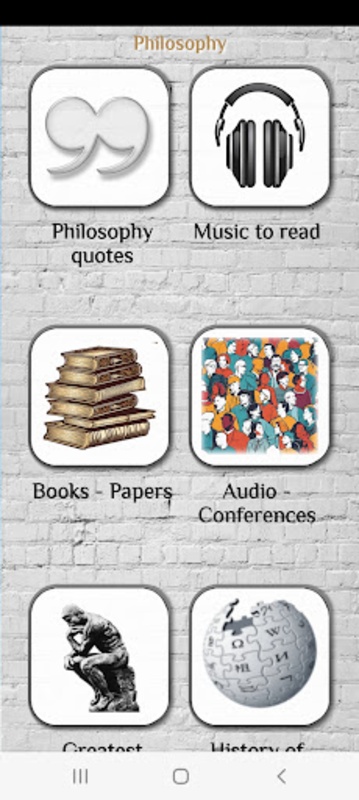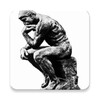Haolingxiazai provides the latest software downloads for Philosophy - Lectures games.


Philosophy - Lectures
| App Name | Philosophy - Lectures |
|---|---|
| Genre | Casual |
| Size | 32.46 MB |
| Latest Version | 1.103 |
| MOD Info | Premium Unlocked |
| Get it On |

|
Discover the profound world of philosophy with the app "Philosophy - Lectures." Designed with ease of use in mind, it offers the unique opportunity to delve into philosophical thought through engaging lectures on your mobile device. Immerse in the teachings of some of the most influential philosophers like Plato, Aristotle, Socrates, Nietzsche, Hume, Kant, Locke, and Karl Marx.
By combining the flexibility of online learning with the richness of philosophical inquiry, these virtual lectures are suited for learners at all levels. They provide a window into the world of intellectual debate and self-reflection. Each video lecture, sourced from reputable channels on YouTube, promises to enhance understanding while contributing to the growth of the channels viewed.
Philosophy - Lectures with Clear Logic and Accurate Information
Philosophy is a broad and multifaceted discipline that explores fundamental questions about existence, knowledge, values, reason, mind, and language. This course provides a comprehensive overview of the major philosophical traditions and ideas, offering a clear and logical framework for understanding the complex and often abstract concepts that lie at the heart of philosophical inquiry.
Ancient Philosophy
The course begins with an exploration of the origins of Western philosophy in ancient Greece. Students will encounter the foundational ideas of pre-Socratic philosophers such as Thales, Anaximander, and Heraclitus, who grappled with questions about the nature of reality and the cosmos. The course then delves into the contributions of Socrates, Plato, and Aristotle, three towering figures who shaped the course of philosophical thought for centuries to come.
Medieval Philosophy
The course continues with an examination of medieval philosophy, which flourished in Europe from the 5th to the 15th centuries. Students will study the works of Christian thinkers such as Augustine of Hippo and Thomas Aquinas, who sought to reconcile faith and reason. The course also explores the rise of Islamic philosophy, represented by figures such as Al-Farabi and Averroes, who made significant contributions to logic, metaphysics, and ethics.
Modern Philosophy
The course then turns to modern philosophy, which emerged in the 17th and 18th centuries. Students will encounter the ideas of influential thinkers such as René Descartes, John Locke, and David Hume, who challenged traditional assumptions about knowledge, the mind, and the nature of reality. The course also examines the development of Enlightenment thought, which emphasized reason and individualism.
Contemporary Philosophy
The course concludes with an exploration of contemporary philosophy, which encompasses a wide range of diverse and often conflicting ideas. Students will study the works of 20th-century philosophers such as Bertrand Russell, Ludwig Wittgenstein, and Martin Heidegger, who grappled with questions about language, logic, and the meaning of existence. The course also examines the emergence of new philosophical movements, such as existentialism, phenomenology, and analytic philosophy.
Features of the Course
* Clear and logical presentation: The course is designed to make complex philosophical concepts accessible and understandable to students of all levels.
* Accurate and up-to-date information: The course draws on the latest scholarship to provide students with a comprehensive and accurate overview of the major philosophical traditions and ideas.
* Engaging and interactive lectures: Lectures are delivered in an engaging and interactive manner, encouraging students to actively participate in the learning process.
* Supplemental materials: Students have access to a range of supplemental materials, including readings, videos, and discussion forums, to enhance their understanding of the course material.
* Assessment: Students are assessed through a combination of assignments, quizzes, and exams designed to test their knowledge and understanding of the course content.











